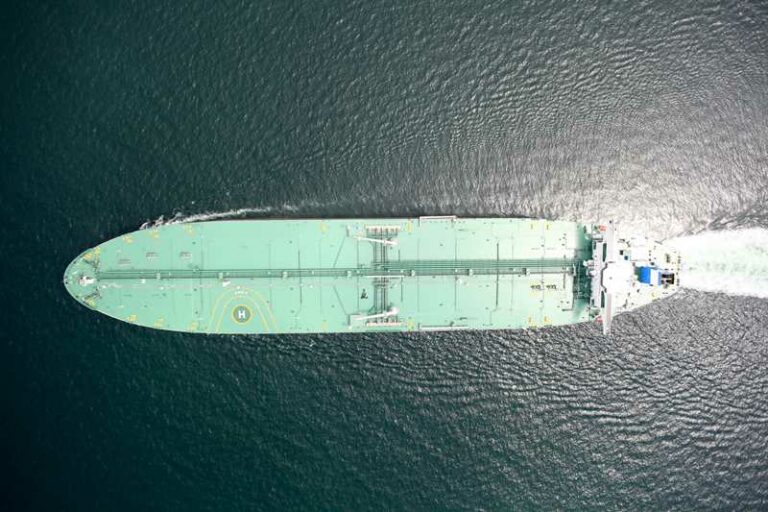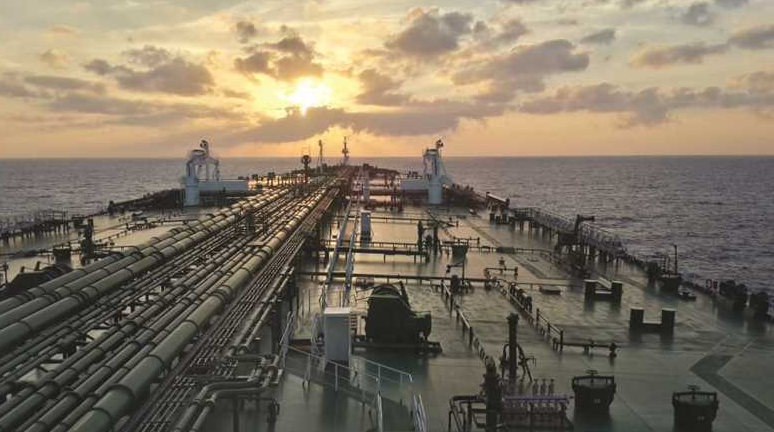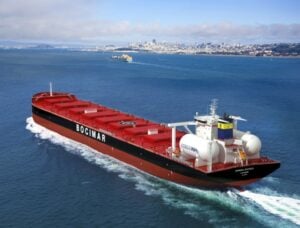The global shipping industry is undergoing a profound transformation, and it’s not just about what fuel vessels burn.
 Illustration; Image credit Euronav
Illustration; Image credit Euronav
In a recent panel hosted by the Global Maritime Forum that brought together influential figures from the sector, including Michael Parker, Chairman of the Poseidon Principles, General Manager of Euronav, Michail Malliaros and Vineet Mittal, Chairman of the Avaada Group, it became evident that decarbonization is more than a technical switch; it’s a cultural shift that promises to reshape the entire value chain of shipping.
In this insightful presentation, Malliaros emphasized that decarbonization is no longer the endpoint achieved solely by switching to green fuels; it has become an attitude, a way of life, and a new approach to working that is driving the industry forward.
Malliaros highlighted that Euronav’s initial focus was on operational efficiency to reduce consumption and emissions promptly. By embracing digital tools and enhancing operational efficiency, including those developed in-house, the company availed of the low-hanging fruits and is now pursuing the next stage, i.e., pilot projects for existing and emerging technologies.
“Finally, in our orderbook there are ‘ready’ vessels only, and now we will start accelerating. Indeed, I think we prepared a very healthy framework, and at the right moment we will be able to accelerate our efforts and decarbonize,” Malliaros said.
“I think it’s fair to say that although the IMO decarbonization targets are really ambitious, 5-10% uptake of green fuels by 2030, I strongly believe that the shipping industry will be able to catch up with this,” he added.
Euronav initially ordered LNG-ready, scrubber-fitted very large crude carriers, which were delivered earlier this year. However, the duo is being acquired by Frontline as part of a recently announced deal with Euronav’s biggest shareholder CMB.

Posted: 10 days ago
In 2022, the company went a step further ordering two new eco-friendly Suezmax tankers from South Korean shipbuilding firm Daehan Shipbuilding Co.
They have the structural notation to be liquefied natural gas (LNG) ready, with both partners working closely to also have the structural notation to be ammonia and methanol ready. This provides the option to switch to other fuels at a later stage, according to the company.
Euronav also lifted options for two ammonia-ready VLCCs earlier this year further bolstering its decarbonization efforts.
Once the deal with Frontline is finalized, Euronav is poised to accelerate its adoption of green fuels, with ammonia and hydrogen at the helm.
Specifically, CMB has laid out a strategic plan for Euronav, centered on three key pillars: fleet diversification, decarbonization, and optimization.
First and foremost, CMB wants to reduce Euronav’s dependence on the crude oil transportation segment by diversifying Euronav’s fleet.
This diversification will include acquiring second-hand future-proof tonnage, ordering newbuildings, and potentially adding part or entire CMB and CMB.TECH’s future-proof fleet to Euronav’s portfolio, with a focus on low-carbon emitting ships, hydrogen and ammonia-powered ships.

Posted: 10 days ago
When discussing the industry’s ambitious decarbonization goals, Michail Malliaros acknowledged the challenges. Despite uncertainties surrounding the supply of green fuels, other aspects of the process remain well within the industry’s control.
Speaking about fuel choices, Malliaros said that the debate about the right fuel in the context of competition is not worth having, because the decision basically boils down to fuel availability.
“A big question mark for us is, indeed, the supply of green fuels, and there we have no control. But, on the entire processes that we can influence and we can have control, for sure we are going to comply.“
“We have to examine the supply and what quick wins we can capitalize on today and what might evolve in the future. It’s not a one-size-fits-all solution because there are different types of vessels, different routes, and varying vessel sizes. We have to scrutinize the supply, gauge vessel capacities, and then make investment decisions accordingly,” he added.
While the discussion centers on the supply of green fuels, Malliaros draws attention to the feasibility of methanol for short-term investments, whereas ammonia emerges as a promising contender for the future with hydrogen.
The demand for green fuels is on the rise, and real-world actions from various stakeholders will play a pivotal role in achieving the sector’s decarbonization goals. One of the key takeaways is that the industry needs to start ordering more ships to meet the ambitious 2030 targets.
Moreover, the role of taxonomy and mandates has emerged as a significant driving force in this transformation. Taxonomy provides clear criteria for green fuels, offering a structured framework for assessing and differentiating between sustainable and unsustainable options.
This clarity enables industry participants to make informed decisions, ensure compliance with emission standards, and promote responsible practices in the shipping industry. Mandates imposed by regulators are reinforcing these efforts, compelling both state and non-state actors to take tangible steps towards achieving industry-wide decarbonization.
As the industry continues to progress, it is evident that decarbonization is not just a vision but a tangible action plan, and the journey has only just begun.
>>> Read full article>>>
Copyright for syndicated content belongs to the linked Source : OffshoreEnergy – https://www.offshore-energy.biz/decarbonization-in-shipping-more-than-fuel-its-an-attitude/










